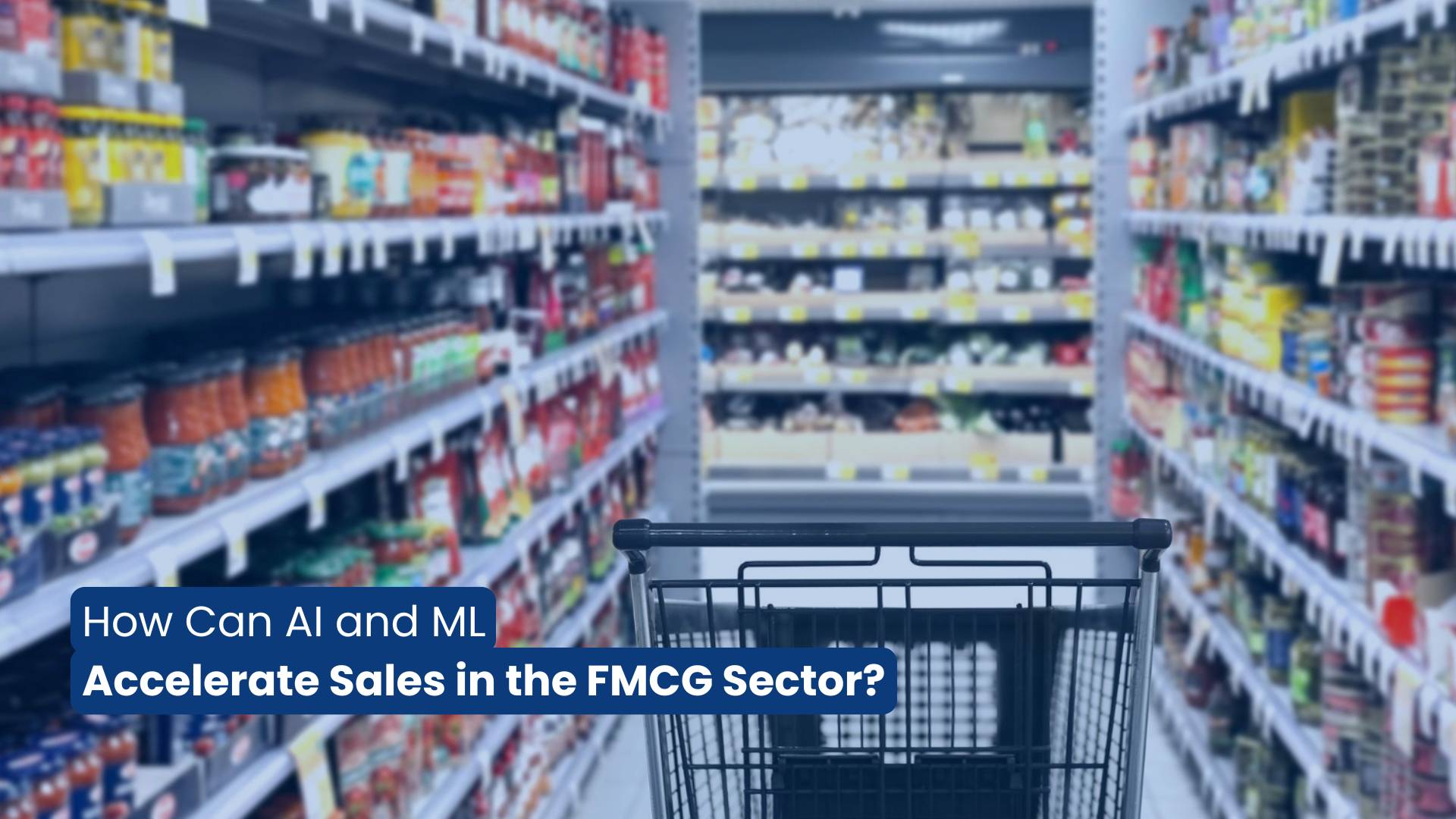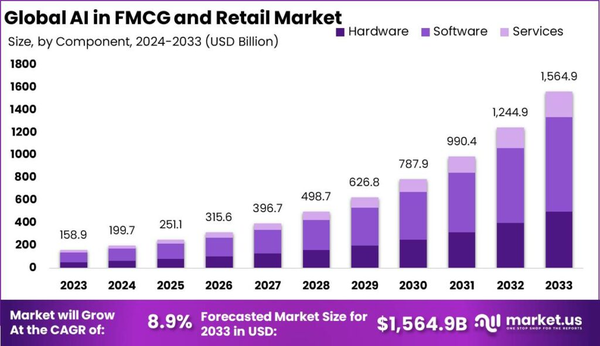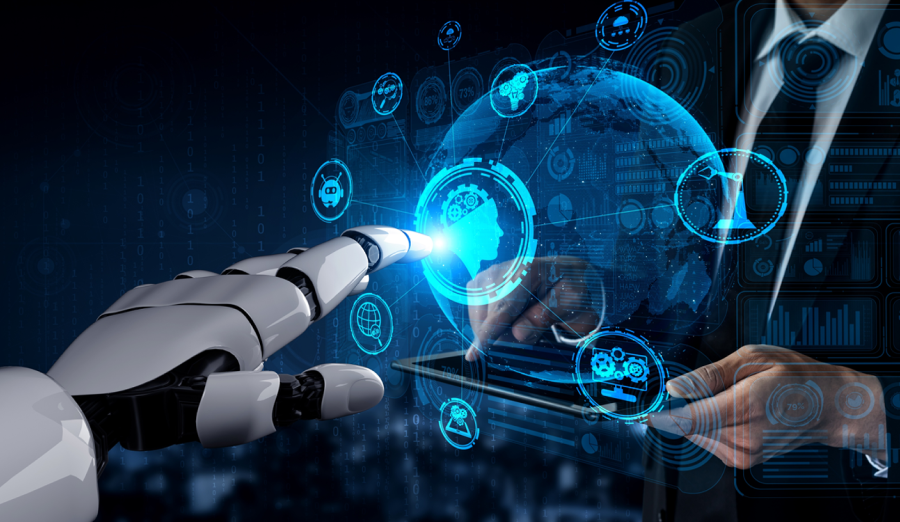Streamline Your Data Processes - Start a project!
Get customized solutions for your business - Try Our Services Today!
Streamline Your eCommerce Operations - Try Our Services Today!

How Can AI and ML Accelerate Sales in the FMCG Sector?
The Fast Moving Consumer Goods (FMCG) industry has never been exposed to dynamic factors that are observed in today's global business environment. With the changes in consumer’s behaviour and the complexity in the market environment, companies have started equipping advanced technological tools. Of these technologies, AI & ML are the two most revolutionary technologies that help to bring innovative solutions to increase sales and operational effectiveness.
AI and ML as a Powerful Tool for FMCG
Artificial Intelligence and Machine Learning are changing the behaviour and business models of FMCG companies across their value chain. These technologies help companies to analyze a large amount of information, find patterns that are not easily recognizable, and make decisions based on the data. The use of AI and ML in FMCG companies helps in the enhancement of sales methods, improved customer satisfaction, and ultimately faster growth within a saturated market.

Source - market.us
How can AI and ML technologies drive sales growth in the FMCG sector?
AI and ML can accelerate sales in the FMCG sector through several key mechanisms:
Predictive Analytics
By analyzing historical sales data, AI can forecast demand trends, enabling companies to optimize inventory levels. This ensures that products are available when customers want them, reducing stockouts and excess inventory costs.
Cross-channel integration
AI can be used to analyze data across multiple digital platforms, enabling a unified approach to advertising across channels like social media, search engines, and websites
Personalised Experience
Machine learning algorithms can analyze consumer behavior and preferences to deliver personalized marketing messages. This targeted approach increases engagement and conversion rates, ultimately driving sales.
Supply Chain Optimization
AI can enhance supply chain efficiency by predicting disruptions and optimizing logistics. This leads to reduced lead times and improved product availability, which are crucial for maintaining customer satisfaction in the FMCG sector.
Dynamic Pricing Model
AI algorithms can analyze market conditions, competitor pricing, and consumer demand to adjust prices dynamically. This ensures that companies remain competitive while maximizing profit margins.
Customer Data Insights
AI tools can analyze vast amounts of data from various sources, including social media and customer feedback, providing insights into consumer preferences and emerging trends. This information helps companies adapt their strategies to meet changing demands.
AI Service Bots
AI and ML can be used to power chatbots and virtual assistants that can provide customer service 24/7. This can help FMCG companies to improve customer satisfaction and loyalty.
Key Benefits of Using AI and ML for Sales Acceleration in FMCG
The integration of AI and ML in the FMCG sector offers several benefits:
-
Loyal Customers- With the help of personalized experiences customers are more loyal and tend to purchase from the same company more often.
-
Improved Efficiency - Repetitive tasks like ordering, restocking, and delivery can be time-consuming and can be done easily through automation, thus saving time for more important activities.
-
Enhanced Decision-Making - Data-driven insights enable better decision-making across all levels of the organization, from marketing strategies to product development.
-
Cost Reduction - By optimizing supply chain operations and reducing waste through better demand forecasting, companies can significantly lower operational costs.
-
Innovative Product Development: By analyzing consumer data and market trends, AI can help identify gaps in the market and guide the development of new products that meet emerging consumer needs.
How can FMCG companies implement AI and ML to improve their sales strategies?
There are a number of steps that FMCG companies can take to implement AI and ML to improve their sales strategies. These include:
-
Identify the business goals: The first step is to identify the specific business goals that AI and ML can help to achieve. For example, a company might want to use AI and ML to improve demand forecasting, personalize marketing campaigns, or optimize pricing.
-
Collect data: AI and ML algorithms require a large amount of data to function effectively. FMCG companies will need to collect data from a variety of sources, such as sales data, customer data, and market research data.
-
Choose the right tools and technologies: There are a number of AI and ML tools and technologies available on the market. FMCG companies will need to choose the tools that are right for their specific needs and budget.
-
Build a team of experts: FMCG companies will need to build a team of experts who have the skills and knowledge to implement and manage AI and ML projects.
-
Change management: Implementing AI and ML can be a significant change for an organization. FMCG companies will need to have a plan for managing change and ensuring that employees are on board with the new technology.
Real-World Success Stories
Here are a few examples of how FMCG companies are using AI and ML to improve their sales strategies:
-
Coca-Cola is using AI to create advanced B2B platforms by personalising marketing campaigns and optimising pricing.
-
Nestle is using AI to improve demand forecasting and supply chain management.
-
Procter & Gamble is using AI to develop new products and improve customer service.
-
Unilever is using ML algorith ms to design & deploy products and optimize operational efficiency, resulting in significant improvements in ROI and customer engagement.
Conclusion
The utilisation of AI and ML in the FMCG sector is a revolutionary opportunity for the sales acceleration of the products. Through the use of predictive analytics, cross-channel integration, personalization, supply chain management, dynamic pricing, and customer data understanding & service, businesses can improve their competitiveness with high sales revenues. Thus, it is important for FMCG companies to apply these technologies for survival in this new and rapidly changing business environment.
Are you Prepared to transform your FMCG business with AI and ML?
Syncrasy Tech has expertise in AI and ML solutions for the FMCG industry. If you want to know more about how AI and ML can enable your business to achieve faster sales, Get in Touch with Syncrasy Tech now!
Categories
- Digital Asset Management (DAM)
- Artificial Intelligence (AI)
- Product Information Management (PIM)
- E-commerce
- Master Data Management (MDM)
- Digital Experience Management
- Customer Data Platform
- Data Management Platform
- Recruitment
- Covid-19
- Digital Workspace
- Digital Experience Portal (DXP)
- Omnichannel Experience
- Pimcore
- Framework Comparison
- Software Development
- Learning Management Solution (LMS)
- CRM System
- Sales Portal
- Salesforce
- Blockchain Development
- App Development
- Technology
Similar Blogs

AI-Powered Digital Experience Management: A Marketing Game-Changer
In today's digital age, the customer experience is most significant. Building customer loyalty and d...
Read More
Enhancing Pimcore Data Quality using Artificial Intelligence (AI)
In a world where businesses constantly evolve, effective information delivery is crucial. Organisati...
Read More
Reinventing Customer Data Platform with the power of AI
In today’s digital landscape, delivering a personalized and enhanced customer experience has become ...
Read More
Role of AI in Solving the Issues of E-commerce Businesses
In terms of where the ecommerce industry is and where it’s headed, you have to start thinking about ...
Read More

